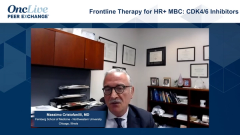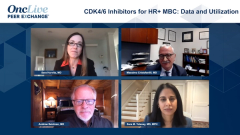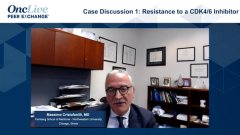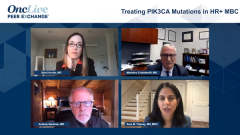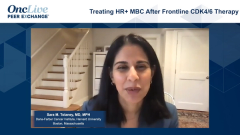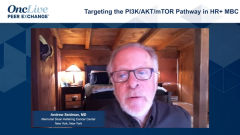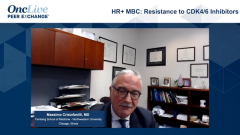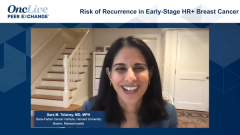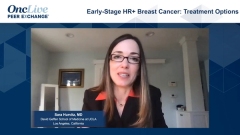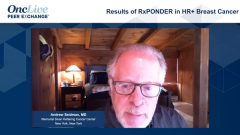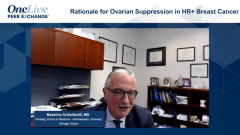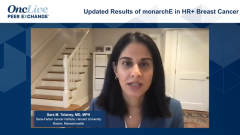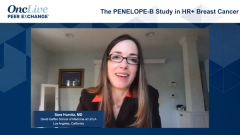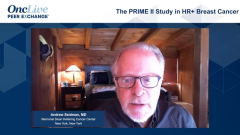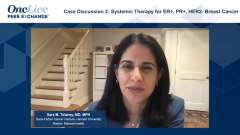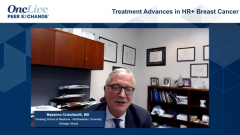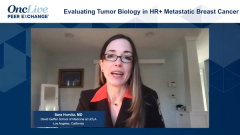
Frontline Therapy for HR+ MBC: CDK4/6 Inhibitors
Episodes in this series

Sara Hurvitz, MD: All the features you bring up are important when we’re evaluating a patient. In addition to looking at comorbidities, they help predict how they’re going to do overall. But as we begin to go into the clinical trial data, it’s probably important for us to distinguish what’s prognostic and what’s predictive of benefit from a therapy.
Massimo, take us through the phase 3 data relating to CDK4/6 inhibitors in the frontline setting, supporting the use of these agents in the frontline setting. We have 3 inhibitors. Take us through the 4 clinical trials that have frontline patients. I may be miscounting. There seems to be a lot relating to the use of these drugs and the differences in these clinical trials, highlighting the overall survival that we’ve seen in the frontline setting and what we’re waiting to see.
Massimo Cristofanilli, MD: The CDK4/6 inhibitors have completely changed our view on how we manage patients with hormone receptor–positive disease. For the first time, we started to see an overall survival benefit. We’ve never thought that this was going to be possible.
There are a number of studies—MONARCH 2, MONALEESA-7, MONALEESA-3—looking at the combinations of endocrine agents. Most of the time, Faslodex or a combination of hormone blockage with standard endocrine therapy has shown that compared with standard endocrine therapy, there is an improvement in survival even though they have expression in the front line. We’re starting to look at the differences in the studies to see the different populations.
Also, this was the first Alliance study to use an AI [aromatase inhibitor] or fulvestrant in the patients in the metastatic arm. In the cases where this was perimenopausal, premenopausal, there was a group of patients also in the first line. They were not exposed, but the majority were mostly endocrine resistant.
There are some studies where the patients were endocrine resistant by definition. Some others included de novo, in which the patient has not been exposed to prior endocrine therapy. These characteristics are important when we are using it in clinical practice. Other factors have been brought up and analyzed when we look at the specific studies: site of metastasis and their setting of endocrine resistance in the disease. It seems like some of the agents would be more effective in endocrine resistance or visceral metastases. Some of the others are particularly effective in endocrine sensitivity and bone disease. So it’s very difficult to figure out if this is an agent difference or if it is a characteristic of the patients enrolled in the study. The 3 agents may be similar.
When you look at the data and, particularly when you are in front of a patient, you need to decide. All this will eventually play a role. For example, if you have a first line, maybe de novo and bone disease only, there’s no question that using palbociclib in combination with an AI is absolutely a reasonable choice. If you have premenopausal patients who develop metastatic recurrence or have not been treated, ribociclib pretty much is supported by the data.
At the same time, if you have a primary-resistant disease, maybe with visceral metastases or liver disease, abemaciclib is something that may make them more comfortable. This is not necessarily because of the difference in the agents but primarily because of the data focus or reach of this particular population. Obviously toxicity profile plays a role. How many times have we seen an older woman and maybe their bone marrow is not perfect? You don’t want to de-escalate Ibrance or overdose. So you will just say 1 agent instead of the other because some other patients have more sensitive GI [gastrointestinal] symptoms, and you feel comfortable using Ibrance instead of abemaciclib. It’s great that we have all these agents and these options, because all of them have great efficacy in combination advantages.
Sara Hurvitz, MD: Excellent. Sara, are there any patients for whom you would not use a CDK4/6 inhibitor in the frontline setting? Have you run into that in the last year or so, where you say it’s just not appropriate or you don’t think they’ll benefit?
Sara Tolaney, MD: There are very few patients for whom that’s actually happened. As Massimo was saying, there’s the benefit of PFS [progression-free survival], and now we’re seeing signals for survival. The benefits are so compelling that you really do want to give patients CKD4/6 inhibition. The challenge though is that 1, we can’t find a patient who’s not benefiting from therapy when we look at all the subgroup analyses. In general, everyone is deriving benefit. But it’s a little more challenging to take therapy with the CKD4/6 inhibitors than it would be to take endocrine treatment alone. We obviously know there are patients who do well with endocrine treatment alone, sometimes on an AI for years, but we can’t figure out who those patients are to know up front whom we can omit the treatment from.
I want to try to give it to patients, but they have to come in more frequently for lab checks. There are some older patients I have who just can’t get into clinics or a lab to get their blood drawn. The comorbidities are such that it just would be challenging. So it’s a rare patient. We know the older patients benefit, just like the younger ones, but they do have a little more in terms of toxicity. It is something that we have to factor in—just the practicality with their other comorbidities and how challenging it is for them to come in for more frequent evaluations.
Sara Hurvitz, MD: Yeah, the forest plots are pretty striking across the different clinical trials, so you can’t pick out a subgroup who doesn’t appear to benefit. The comorbidities are a key point, as is the toxicity profile that Massimo brought up as well.
Transcript Edited for Clarity


